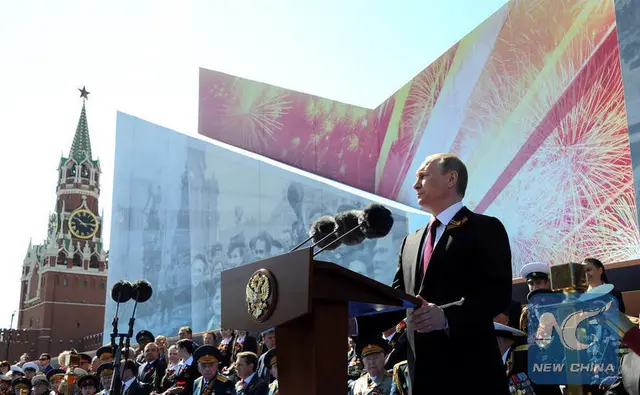An annual parade was held here Monday at the downtown Red Square to celebrate the 71th anniversary of the victory in the Great Patriotic War, Russia's term for World War II (WWII).
In an address at the beginning of the parade, Russian President Vladimir Putin said national cohesion and faithfulness are honored as the source of Russian people's strength, confidence and dignity.
Recalling the "age of courage and bravery," Putin paid tribute to the soldiers who fought for their motherland.
The Victory Day celebration has become a symbol of "the sacred kinship of Russia and its people," Putin said.
The president also warned that human civilization today is again confronted with cruelty and violence, while terrorism has become a global threat that all countries need to fight together.
Russia is ready to work with all countries to create a modern, non-bloc system of international security, he added.
In addition to promoting patriotism, the parade was also a chance for Russia to show its military force as 10,000 servicemen, 135 units of military equipment and 71 aircraft were involved.
Starting at 10 a.m. local time (0700 GMT), the parade mainly consisted of the ground column, the mobile column and the flypast.
Several military equipment that made their parade debut at last year's grand parade were featured again this year, including Kurganets-25 infantry fighting vehicles and Koalitsiya-SV self-propelled tracked howitzers.
Moreover, the combat aircraft that took part in Russia's anti-terrorist operation in Syria also participated in the parade.
The highlight of the parade was the traditional release of smoke in the colors of the Russian flag by Su-25 airplanes, cheered by crowds choking the streets around the Kremlin.
Apart from Moscow, military parades were held in other Russian cities, such as St. Petersburg and the central Russian city of Yekaterinburg.
The annual commemoration has become a source of national self-esteem for Russian people as citizens join public processions called "Immortal Regiment," which first took place in 2012 and have become an annual national civil-patriotic movement.
The marches are not only held throughout Russia, but in foreign countries, including the United States, Germany, Switzerland and the Czech Republic.
Moscow city authorities said some 800,000 people are expected to participate in the Immortal Regiment march this year.
People joining the march carry photographs of their ancestors who served in WWII, while Putin in 2015 led the Moscow leg carrying his father's portrait.
Through commemorative events, the notions of self-defense and national security are being exalted in Russia as the country is still suffering from an economic downturn amid Western sanctions imposed over Russia's role in the Ukraine crisis.
Considering the complex world security situation, it is high time for the United Nations to "serve as the best injection against further wars," Russian WWII veteran Yuri Yasnev told Xinhua.
Yasnev added that all countries and international organizations should also put an end to the global nuclear arms race and solve hot-spot issues using all means possible. Enditem
 简体中文
简体中文

